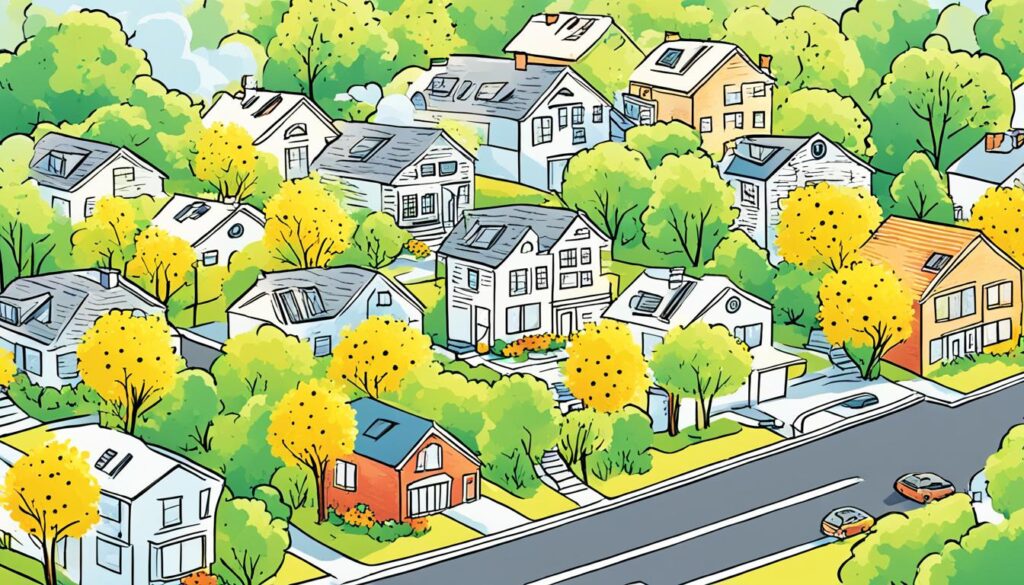
Did you know that over 9 million Canadians suffer from seasonal allergies every year? That’s a staggering number, and if you’re one of those individuals, you understand the impact that allergies can have on your daily life. As the pollen season approaches during spring and summer, it’s crucial to take proactive steps to ensure a cleaner and healthier indoor environment.
At Veteran Heating and Cooling, we understand the importance of air quality when it comes to allergies. That’s why we’re here to help you prepare your HVAC system for the upcoming pollen season. By optimizing your HVAC system and taking necessary precautions, you can significantly reduce the presence of pollen inside your home and alleviate allergy symptoms.
From maintaining your HVAC system to changing filters and investing in air purifiers, we have the expertise to guide you through each step. With our extensive experience as a leading HVAC company in Canada, we provide quality services, including servicing, installations, and assistance with rebates.
Don’t let allergies dictate your life this spring and summer. Contact Veteran Heating and Cooling at 604-991-4894 , and we’ll ensure your HVAC system is ready to combat the pollen season. From Vancouver to Hope, we’ve got you covered!
Why Air Quality Matters for Allergies
When it comes to allergies, indoor air quality plays a crucial role. Poor air quality can exacerbate allergy symptoms and make it harder for individuals with allergies to find relief in the comfort of their homes.
Allergens such as pollen, dust mites, pet dander, and mold spores can linger in indoor air, triggering allergic reactions and causing discomfort. This is especially problematic for those with asthma, whose symptoms can be triggered or worsened by poor air quality.
Fortunately, your HVAC system can help improve indoor air quality and create a healthier living environment. By understanding how air quality affects allergies and taking necessary steps to maintain your HVAC system, you can create a haven for allergy sufferers.
- Regular maintenance: Ensuring that your HVAC system is well-maintained is vital for preventing allergens from circulating in your home. Regular inspections, cleaning, and servicing by a professional technician can help identify and resolve any issues that may be affecting air quality.
- Filter changes: Changing your HVAC system’s air filters regularly is another essential step in improving air quality. Filters trap and remove pollutants and allergens, preventing them from being recirculated throughout your home. Make sure to replace filters as recommended by the manufacturer or your HVAC technician.
- Air purifiers: Consider installing an air purifier in your home to further enhance indoor air quality. Air purifiers work by capturing and eliminating airborne pollutants and allergens, providing an additional layer of protection against allergens. Choose an air purifier that suits your needs and consult with a professional for guidance.
By prioritizing air quality and implementing these measures, you can significantly reduce allergy symptoms and create a more comfortable living space for yourself and your loved ones.

Preparing Your HVAC System for Pollen Season
One of the most crucial maintenance tasks to combat pollen is regularly changing your HVAC system’s filters. A dirty filter can become a breeding ground for pollen and other allergens, reducing the air quality in your home. Make it a habit to replace your filters every few months, or more frequently, if you or your family members suffer from severe allergies. Remember, a clean filter means cleaner air!
In addition to filter changes, investing in an air purifier can provide an extra layer of defense against pollen. These devices trap and remove pollutants, including pollen, from the air, ensuring that the air circulating in your home remains clean and pollen-free. Consider placing an air purifier in spaces where you spend most of your time, such as living rooms or bedrooms, for maximum effectiveness.
Lastly, optimizing the use of your air conditioning, heat pump, or ductless mini-split can help keep pollen at bay. During pollen season, close your windows and rely on your HVAC system to cool or heat your home instead. This will prevent pollen from infiltrating your living spaces and ensure that the air indoors is properly filtered. Remember, a well-maintained and efficiently running HVAC system is your ally against pollen and allergies!
FAQ
Why is indoor air quality important for allergies?
Indoor air quality plays a crucial role in allergies. Poor air quality can worsen allergy symptoms and make it harder for individuals to find relief in their homes. Ensuring clean and allergen-free air is essential for managing allergies effectively.
How can my HVAC system improve indoor air quality?
Your HVAC system can help improve indoor air quality by filtering out allergens, dust, and pollutants. Regular maintenance, including filter changes, ensures that your system is running efficiently and effectively removing allergens from the air.
How often should I change my HVAC filters during the pollen season?
During the pollen season, it is recommended to change your HVAC filters every one to three months. This frequency will help prevent the accumulation of pollen and other allergens in your HVAC system, improving indoor air quality.
Should I invest in an air purifier for my home?
Investing in an air purifier can be beneficial for allergy sufferers. Air purifiers work alongside your HVAC system to capture and neutralize allergens, improving the overall air quality in your home. Consider selecting an air purifier with a HEPA filter for optimal results.
How can I effectively use my air conditioning to reduce pollen indoors?
To reduce pollen indoors, use your air conditioning system wisely. Keep windows and doors closed to prevent outdoor allergens from entering your home. Ensure that your air conditioning system is in good working condition, and consider scheduling a maintenance check to ensure maximum efficiency.
Can a heat pump or ductless mini-split also help reduce pollen indoors?
Yes, heat pumps and ductless mini-splits can also contribute to reducing pollen indoors. These systems can filter and circulate air effectively, helping to minimize the presence of allergens in your home. Regular maintenance and filter changes are key to ensuring optimal performance.
